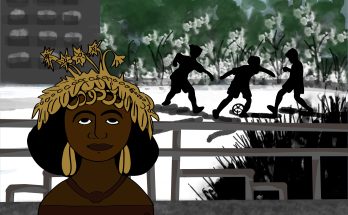This year’s theme of Subversive Film Festival first week, and the second week of Subversive Forum is Freedom Fighters and Poetic Justice. With various contents connected to the mentioned topic, as well as the fact that it’s an American movie, Lucky perfectly fits into this subject and the possibilities of its elaboration in the field of contemporary film.
Contemplating followed by sharp dialogues, the old cowboy goes through his daily routine step by step, surrounded by the smoke of the indispensable American Spirit cigarette. While Timms and Cash’s country was playing in the background, his hat and Saguaro cacti were being burnt by the desert sun.
A sort of American film which almost doesn’t exist any more, Lucky reveals to us a calm side of the American society, with no dazzle, applications and affectations. It reveals people under the burden of thoughts about the passing of life, who in the often-mentioned reality are scared of themselves and are not ashamed to speak of it.
Harry Dean Stanton, the central figure nicknamed Lucky, is a war cook and a self-indulgent who enjoys quizzes and crosswords, and intrinsically feels that the time has come for him to abandon this world. Since he is quite direct and modest, he has captivated the locals. They spontaneously take care of him considering him a member of their wider community, which is not a typical picture in a modern American film. Stanton, the incarnation of an American independent actor, as well as a silent cowboy with a mouth organ, was able to pull this off without even hardly trying to. It seems as if he had walked through this movie, which would never achieve what it has without his acting authenticity.
Howie, his teammate (played by David Lynch) is one of the great situations where the real world overlaps with the film world. Since Lynch and Stanton have so far together made many good films and Lynch has given him such genius roles, the moments of their final encounters in front of the camera are very significant. Also, here is the fact that this is one of the last Stanton’s movies, as the legendary actor passed away this summer at the age of 92.
Lucky is a fierce fighter for knowledge, truth and the beauty of life even in his fragile setting. Despising the capitalist methods of charging what has already been charged and the machination of over-priced packages under the pretext of necessity, he will spit out yet another genius, somewhat silly Ron Livingston as Bobby the insurance salesman. That way closing the triangle of the ideal actors for the required roles, the filmmaker has brought a lot of style and a pleasant atmosphere to the film. Thus he has secured very real characters, people of flesh and blood whose lives are very much real to us as we can feel them.
A feminine figure of the emancipated bar owner Elaine, who is certainly not just another usual maneater, is so perfectly integrated, although she briefly concludes she is not her husband’s woman, but he is her man. A female figure such accurately set in the ‘male’; movie, with the male director and with two male screenwriters, gives this movie a highly subversive tone. In fact, the greatest shame and misery of nowadays actually is that such a film must be called subversive.
A non-pretentious, but a painfully true sentence ‚Ownership is a crap‘, in a world where almost everything comes down to the property rights and all the rights followed by them forms an atheist Lucky into a real Jesus of anti-capitalism. Especially, in one of the strongest scenes in the movie, while acting as a street entertainer, he stood dead serious in front of his buddies in a bar quietly saying ‚One of you will betray me tonight‘.
With melancholic tones and typical aesthetics of the American Southwest in a space where Mexican Spanish and American English equally share their place, our Lucky enters the void of his existence. Emptiness as a motif (using both as an American italinism ‚ungatz‘) is continually emerging throughout the film. That could point to the director’s tendency for Buddhism, while running from the capitalist race prevalent in areas of predominantly Catholic and Protestant religion.
The colossal departure of a great actor, master of many roles to whom he has given the relentless spirit, is as a full stop at the end of the sentence of a long life. Both in the film sense, and at Stanton’s case, in a literal also. Big praise to the director for an excellent final role for the actor, in a movie which presents such a powerful message, in both art film and social cultural field.
The only question remains whether or not present-day America is allowed to send and could actually send such a message?






